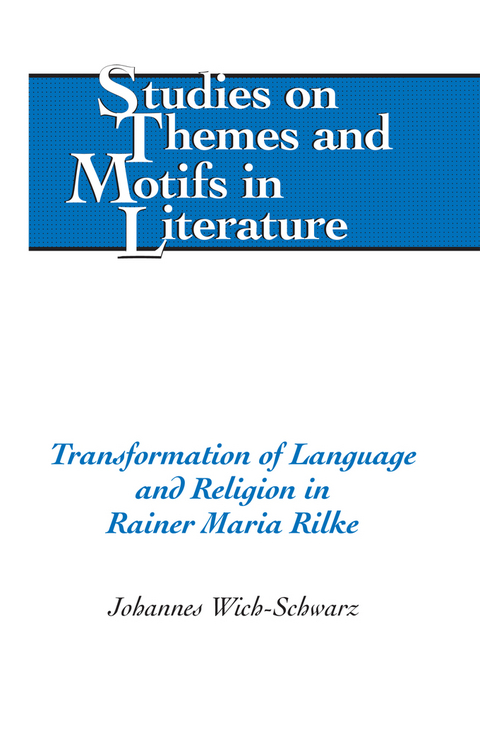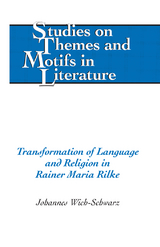Transformation of Language and Religion in Rainer Maria Rilke
Seiten
2011
|
New edition
Peter Lang Publishing Inc (Verlag)
978-1-4331-1481-6 (ISBN)
Peter Lang Publishing Inc (Verlag)
978-1-4331-1481-6 (ISBN)
- Titel z.Zt. nicht lieferbar
- Versandkostenfrei innerhalb Deutschlands
- Auch auf Rechnung
- Verfügbarkeit in der Filiale vor Ort prüfen
- Artikel merken
Rainer Maria Rilke (1875-1926), perhaps the most famous European poet of the twentieth century, exemplifies how the crisis of language inherent in literary Modernism also constitutes a crisis of religious discourse. This book offers readings of major texts such as "The Notebooks of Malte Laurids Brigge" and "The Duino Elegies".
Rainer Maria Rilke (1875-1926), perhaps the most famous European poet of the twentieth century, exemplifies how the «crisis of language» inherent in literary Modernism also constitutes a crisis of religious discourse. In Rilke’s poetry and prose, language replaces God as the focal point of human experience. Yet despite his rejection of Christianity, Rilke crucially draws on Christian imagery to express his Modernist worldview. Transformation of Language and Religion in Rainer Maria Rilke offers new readings of major texts such as The Notebooks of Malte Laurids Brigge and The Duino Elegies, as well as analyzing some of Rilke’s lesser-known works, Visions of Christ and «The Letter of the Young Worker.»
Rainer Maria Rilke (1875-1926), perhaps the most famous European poet of the twentieth century, exemplifies how the «crisis of language» inherent in literary Modernism also constitutes a crisis of religious discourse. In Rilke’s poetry and prose, language replaces God as the focal point of human experience. Yet despite his rejection of Christianity, Rilke crucially draws on Christian imagery to express his Modernist worldview. Transformation of Language and Religion in Rainer Maria Rilke offers new readings of major texts such as The Notebooks of Malte Laurids Brigge and The Duino Elegies, as well as analyzing some of Rilke’s lesser-known works, Visions of Christ and «The Letter of the Young Worker.»
Johannes Wich-Schwarz is Assistant Professor of English and Humanities at Maryville University of St. Louis. He studied literature, philosophy, and religion in Germany, England, and the United States, and received his PhD in religion and literature from Boston University. His research interests include Modernism, post-Holocaust poetry, and literary translation.
| Reihe/Serie | Studies on Themes and Motifs in Literature ; 109 | Studies on Themes and Motifs in Literature ; 109 |
|---|---|
| Verlagsort | New York |
| Sprache | englisch |
| Maße | 155 x 230 mm |
| Gewicht | 370 g |
| Themenwelt | Literatur |
| Schulbuch / Wörterbuch ► Sprach- und Wörterbuch / Deutsch | |
| Schulbuch / Wörterbuch ► Wörterbuch / Fremdsprachen | |
| Geisteswissenschaften ► Religion / Theologie | |
| Geisteswissenschaften ► Sprach- / Literaturwissenschaft ► Anglistik / Amerikanistik | |
| Geisteswissenschaften ► Sprach- / Literaturwissenschaft ► Germanistik | |
| Geisteswissenschaften ► Sprach- / Literaturwissenschaft ► Literaturwissenschaft | |
| Geisteswissenschaften ► Sprach- / Literaturwissenschaft ► Sprachwissenschaft | |
| Schlagworte | Christianity and Literature • Crisis of Language • criticism and interpretation • German Literature • Modernism (literature) • Rainer Maria Rilke, 1875-1926 |
| ISBN-10 | 1-4331-1481-X / 143311481X |
| ISBN-13 | 978-1-4331-1481-6 / 9781433114816 |
| Zustand | Neuware |
| Haben Sie eine Frage zum Produkt? |
Mehr entdecken
aus dem Bereich
aus dem Bereich
Poetik eines sozialen Urteils
Buch | Hardcover (2023)
De Gruyter (Verlag)
59,95 €
Buch | Softcover (2024)
belleville (Verlag)
20,00 €




